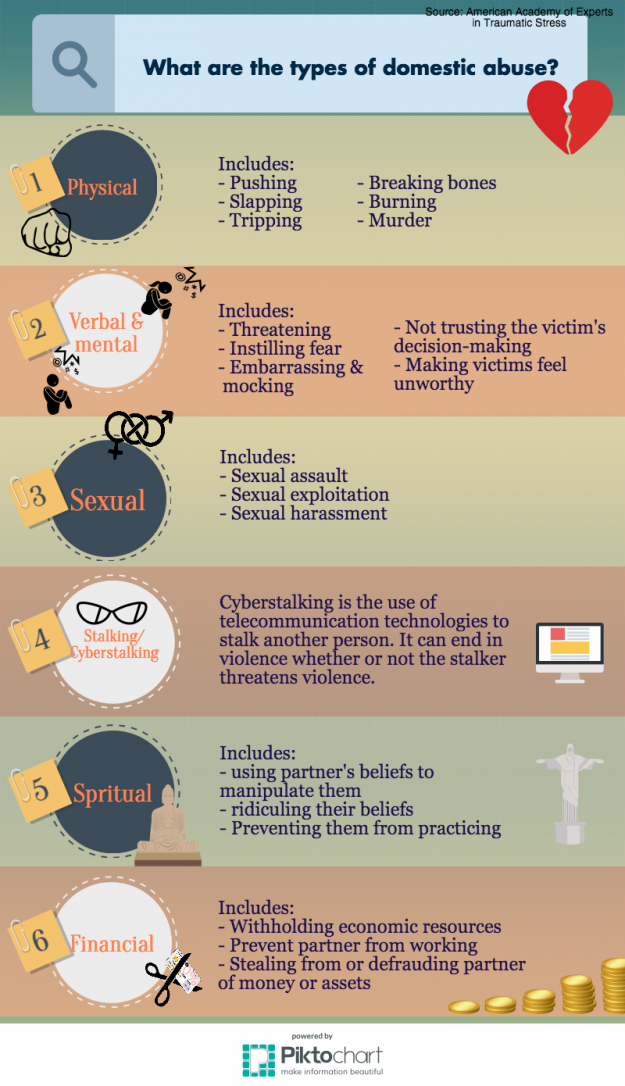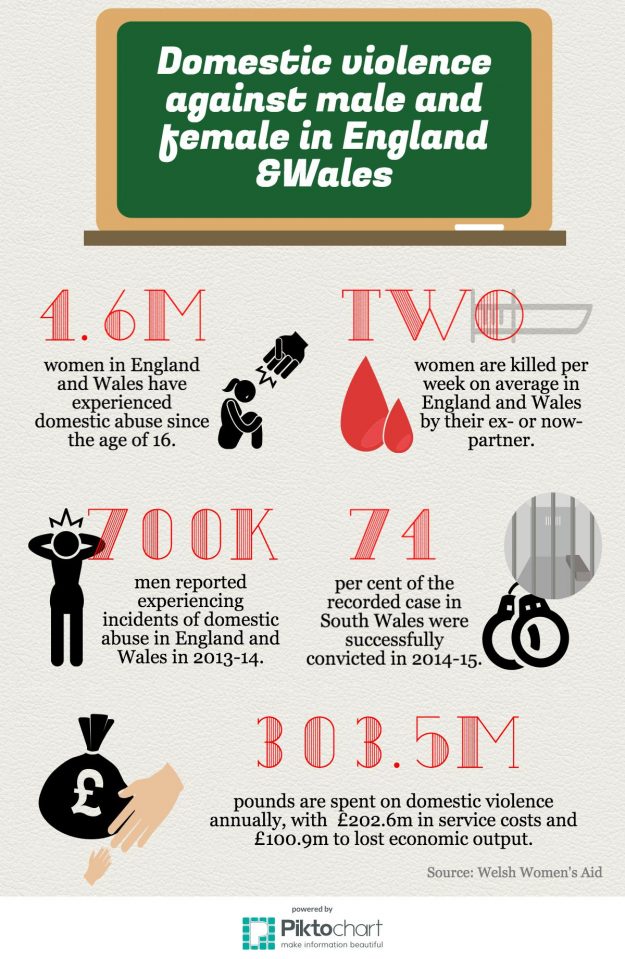Domestic violence is not alien to us anymore, unfortunately. Everyone talks about it, but little do people understand it can be far more than just physical abuse, nor do they see through the struggles that the victims are confronting. How are we going to resolve this altogether?
Building a family with your beloved sounds dreamy. But what if you come down to earth and realise this is actually a nightmare? What if you find out that you are enduring fear and distress every second you spend with your partner?
Your partner might have never hit you. But they might have relentlessly put you down because of your weight, or might have intentionally compared you to more “attractive” people to make you feel unworthy. They might have verbally threatened you. They might have checked your phone and had your bank account under full control without your permission.
And when you call them out, they will always shake you off saying “I care about you.” or “You’re delusional.”
If you’ve checked any of the above, you might be a victim of abuse.
“It[Emotional abuse] can make us question our sanity and reality. It can dent our self-esteem and make us completely, utterly miserable,” domestic abuse advisor Lauren Williams wrote.
Like physical and sexual violence, emotional abuse is just one of the many forms that abuses can manifest in. Domestic abuse as a whole is even more monstrous. According to Domestic Violence Awareness Society (DVAS) from Cardiff University, abuse occurs whenever it involves one partner excessively manipulates the life of the other. Some might be psychological rather than physical.

The adaptable forms of abuses could torture anyone without them noticing. The Crime Survey of England and Wales 2013/14 published some alarming figures that one in four women in England and Wales would experience some sort of domestic violence at some point in their life.
It is important to note that all kinds of abuses are not mutually exclusive, and more often than not they happen together. In such circumstance, victims should seek for advice immediately, instead of considering it as a taboo, according to DVAS.
DVAS was founded last year by a group of female students, who were motivated by the frequent occurrence of domestic abuse incidents and decided to put them to an end. Although the group is rather in small in size with around 20 members, they are extremely dedicated to their work.
Having a great day selling cakes to raise awareness for our cause! #cardiffSU #domesticviolenceawareness pic.twitter.com/dz9kZydYzN
— DVASCU (@DVASCARDIFF) November 25, 2016
People question about this a lot – why is it difficult for victims to let it out and flee?
Not surprisingly, Lucy Edwards, one of the DVAS presidents, reckoned that embarrassment was one of the biggest obstacles. “Considering business figure Gina Miller’s domestic abuse case, she didn’t want to be look down on as she was a renowned businesswoman,” Edwards said.
She continued, “Another reason was her ex-husband had a very gentleman image built, so no one would believe her. No one knew that behind closed doors he’s a nasty piece of work. Why would someone believe that any nice man could be capable of such horrible thing?”
An abusive partner could use more emotional tactics, such as alienating their victim from their family and friends, so that they would feel completely alone eventually. A lot of times victims might not be aware until things become irreversible.
Faulty government policy is problematic when women attempt to escape as well. According to Tamsin Stirling, member of political force Women’s Equality Party Cardiff (WEP), asylum seekers or refugees are only entitled to funds if they are married to a local family. If they divorce, then they would end up having no recourse to public funds and facing troubles to sustain a living.
“There’s definitely an ethnicity perspective here, especially in Cardiff. Financial issue and access to children are of great concern when women are thinking about terminating the relationship,” she said.
“Domestic abuse is devastating but is still not taken as seriously as it should be,” Stirling added, “The problem is always regarded as women’s issue as opposed to an issue that impacts the entire social body.”
In November 2016, WEP held its first annual conference, where young ladies courageously stood up and laid their horrendous experience bare in front of attendees. “People know it[domestic abuse] in their head intellectually, but narrating your experience as a victim for others is always more powerful. It gets people to talk and think about it,” she said.
The first Women’s Equality Party Conference was more personal than political https://t.co/19Uep5e1rF
— WEP Cardiff (@wepSouthWales) November 30, 2016
Watch WEP’s leader Sophie Walker’s speech at the conference above.
Encouraging discussion, of course, constitutes a great part of raising awareness. Active promoting yet is complementary. Stirling noted the party was campaigning for changes top-down and bottom-up. While petitions could push change top-down, on the contrary, education in schools would be a good bottom-up start.
The trio from DVAS agreed that education played a vital role behind the physical representation of the issue since it targeted the attitudinal aspect particularly. Harriet Day, treasurer of DVAS, specifically highlighted that parenting was a very powerful agent, because parents set an example for their children. Worst of all, under constant exposure to violence, children could grow up becoming abusers themselves.
Getting male involvement in tackling domestic abuse is also key to a way out. “It is important to educate guys how they should treat girls,” said Daisy Swan-Capper, social media coordinator of the society, “And the other way round too. Girls should not be taught to think it’s alright to be manipulative by any means.”
They added that domestic abuse was not solely confined to women. People often assume their male equivalent is stronger so he would be less affected. In fact, men should realise they are entitled to complain about abuses as well. In effort to reinforce the importance of all gender’s collective involvement, the committee has planned ahead to work hand-in-hand with sports teams on social media platforms towards raising men’s awareness.

Fortunately, masculinity finds its way into the issue on a country-wide level. Wales-based housing associations Chartered Housing and Bron Afon teamed up to launch The Brother project in 2015. Men aged between 16-25 come together in the name of this project to build positive attitudes to life and to alert youth, particularly young men, that domestic abuse can be equally dangerous for all genders.
The project has been very successful since it offered a unique male perspective, though not without challenges. Gender stereotypes chained to culture could hardly be overcome. Samantha Howells, Community Developing Manager of Family and Young People of Chartered Housing, commented that the approach to women and men were very distinct.
Often men are less willing to engage in solving their problems and are reluctant to concede that they are in jeopardy. “Men apt to find it more difficult to talk about their issues,” Howells explained, “They have a stronger stigma to admit that they are suffering in this metro-culture.”
However, Tamsin Stirling remarked that combatting domestic abuse demanded cultural changes. It was always easier said than done to revolutionise inherit cultural perceptions. “Until we have more manpower across politics, companies and media, it is unlikely that we would make a huge amount of progress,” she said.
Watch below to learn how to escape from domestic abuse in one minute.
Locate Welsh Women’s Aid Cardiff below.
